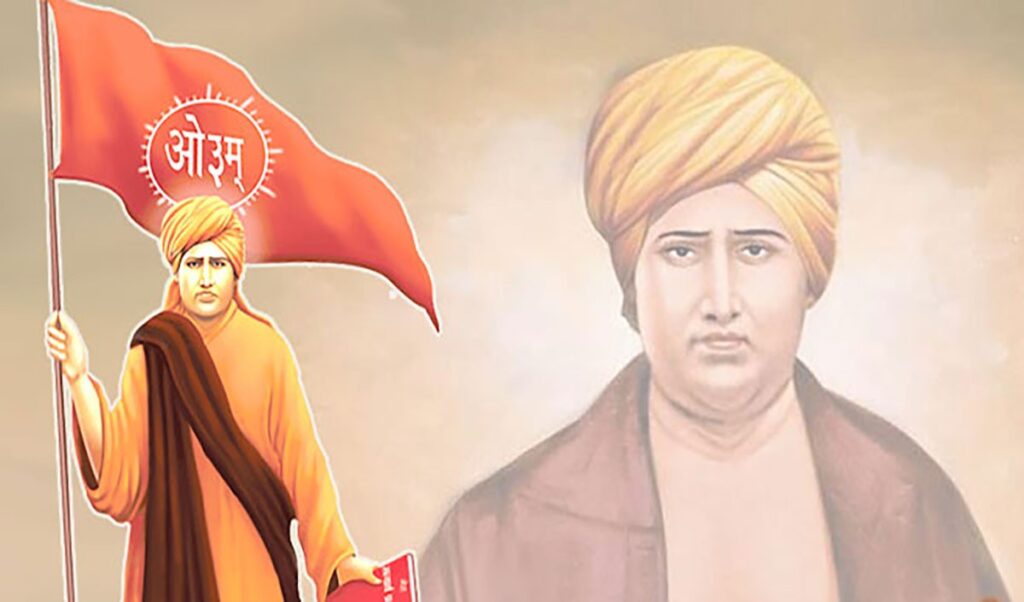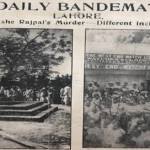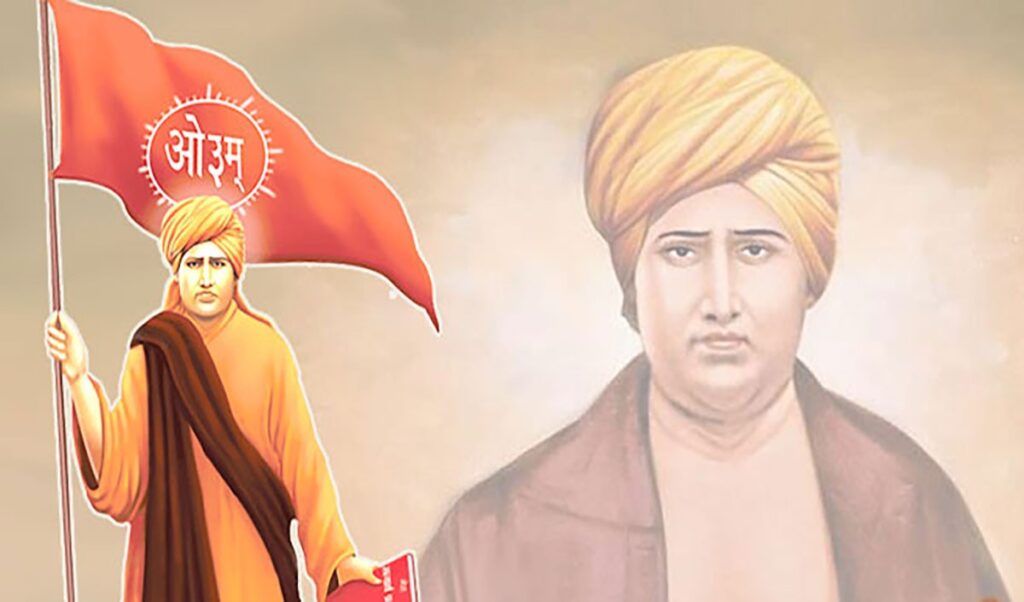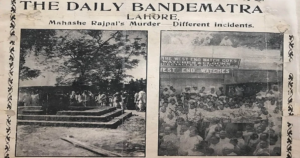BY- Vinay Arya (General Secretary) Delhi Arya Pratinidhi Sabha
Culture, religion and history are the set of traditional rituals of any nation or society which express its conduct, lifestyle, customs, moral, religious and spiritual beliefs. Societies keep on deteriorating after being formed, but culture is neither created nor deteriorated in one era, rather it has a history of its rise, fall, shocks and obstacles for ages. Although many great personalities came forward in the 19th century, the deep impact of the philosophy of Maharishi Dayanand Saraswati ji on India, which gave birth to many ideological movements here, is considered as Indian revival. The study of Indian cultural society and thoughts of modern India and Swami Dayanand Saraswati, the pioneer of aggressive nationalism, is required in the context of national renaissance. At a time when the Indian public was suffering from self-indulgence, inferiority and cowardice, he instilled enthusiasm, self-respect and confidence among Indians by re-establishing Vedic knowledge, Indian philosophy of life and values. By implementing socio-religious reforms in the country, he radiated national spirit. Rather, it revived national identity by countering the then existing national inferiority complex.

At the time when Dayanand Saraswati was born, a person’s varna or caste in the society was determined not on the basis of his birth but on the basis of his deeds. An example of this is Maharishi Valmiki himself who composed Ramayana in Tretayuga. But with time, it was changed by some people into a birth based system, that is, the son of a Brahmin would be a Brahmin and the son of a Kshatriya would be a Kshatriya, which was wrong. He strongly opposed this system and explained to the people that in future this will increase the feeling of bitterness in the society and the unity of Hindus will be in danger. Therefore it is very important that we should decide the varna of a person on the basis of his deeds.
Apart from this, the condition of Shudras gradually became pitiable in the Indian society and people started looking at them with contempt. Always giving them menial jobs, not giving them opportunities for education, not allowing them to go to temples, etc. had become a common practice in many places. Swami Dayanand Saraswati opposed this and requested people to treat everyone equally so that Hindu unity is maintained. At that time, a large number of Shudras were converting to Islam and Buddhism, the main reason for which was the contempt they received from Hinduism. Therefore, Swamiji considered this also a reason for the decline of Hindu religion and mainly laid emphasis on the salvation of Shudras.

If seen, Maharishi Dayanand Saraswati’s philosophy was not only immediate but was also for building the future. Where in the Vedic period, the position of women was very respectable and they also had full right to education. In Hindu religion, no yagya was considered complete without a woman. Along with the gods, there is also mention of goddesses who have shown their knowledge and power from time to time. But with time women were confined only to the doorstep of the house. He was not allowed to go out or study. From the very beginning they were put to household work. Swami Dayanand ji opposed this system and talked about women’s education and equal opportunities. He was a supporter of giving higher education to women. Not only supporters but also established Kanya Gurukuls, opening the doors of education for them.
Along with women’s education, Maharishi Dayanand Saraswati had seen that in some parts of India, there was a tradition of getting children married, that is, they were tied in the bond of marriage at an early age, due to which they did not follow the celibacy rule of their life. Could do it.

In the Vedas, human life was divided into four Ashrams, in which Brahmacharya Ashram was from birth till the age of 25 years. In this, a man had to learn education, military force and other work which he had to do in his family life, but getting married early made the family life a hindrance in celibacy. That is why Swamiji strongly opposed this evil practice also.
Since societies keep getting formed and deteriorating, another evil had taken birth in the contemporary society, which later became a social tradition, the practice of Sati, although this practice had ended to some extent, but it was still practiced in many places. But it was adopted. This practice mainly started when the attacks on India by foreign invaders, especially Afghans and Mughals, had increased a lot. They used to defeat our kings by deceit in the war and after that they used to come to the palace and rape the widowed women. Therefore, to save one’s honor from those cruel demons, the practice of Sati was started.
The country was moving towards independence, the Mughal rule had ended, now there was no justification for this practice nor was it written in the Vedas. Therefore, Maharishi ji explained to the people and in a way made an important contribution in ending this practice.
Apart from this, if we look at the practice of purdah, there is no mention of this practice in the Vedic period. This practice was also started to protect the honor of our sisters and daughters from foreign invaders, which no longer had any justification. That’s why Maharishi ji also opposed this practice. Similarly, his philosophy went towards widow remarriage, that is, in the society, a man whose wife had died was allowed to remarry, but a widowed woman was not allowed to remarry. Also, the life of a widow woman was made very harsh, people looked at her with contempt, she was deprived of any auspicious work of the society and was insulted. Swami Dayanand Saraswati started a movement for widow remarriage and made people aware that just as a widower has the right to remarry, similarly a woman should also have this right. Along with widow remarriage, Maharishi ji also strongly opposed the practice of polygamy practiced by men.

The biggest thing among all these was that the country had been facing fierce attacks from foreign invaders for more than a thousand years and since the 12th century, it was under the rule of Afghans, Mughals and now the British, due to which Indian culture and Hinduism In a way, religion was continuously declining. Earlier, Afghans and Mughals had converted crores of Hindus. The same British, with their devious intelligence, were attracting Indians towards western civilization.
At such a time, Swami Dayanand Saraswati ji awakened the desire for freedom in the minds of the people of the country for the first time. He founded Arya Samaj with the aim of propagating independence and Hinduism. Along with this, in order to unite the country, he emphasized on Hindi language instead of English for common language communication among the people of different states. It was he who first gave the slogan of Swarajya which was later adopted by Lokmanya Tilak. Mahatma Gandhi also considered Swamiji’s important contribution in starting the freedom struggle.
At the same time, by invoking the supremacy of the knowledge and philosophy stored in the Vedas, he countered the then prevailing national inferiority complex and revived the national identity. By strongly denouncing social and religious evils, he became the pioneer of social awakening in the country. He responded to the attacks being made on Hindu religion by Islam and Christianity by clarifying the weaknesses of their religion in his own words and established the superiority of Vedic beliefs, Indian culture and life values. Certainly the expression of his socio-religious ideas paved the way for aggressive nationalism. Dayanand Saraswati did not directly participate in the national independence movement, but the socio-religious-political ideas expressed in his articles, commentaries and discussions and the organization ‘Arya Samaj’ established by him played a notable role in socio-religious revival and awakening of national consciousness. Discharged. If seen, his contribution in the short period of his life in the context of nurturing and promoting Indian culture, national renaissance and intense nationalism was such that it can be called a milestone in the construction of modern India on which the building of future India is clearly visible.
BY- Vinay Arya (General Secretary) Delhi Arya Pratinidhi Sabha










More Stories
That great monk who at a very young age gave something to the society which cannot be forgotten. Swami Darshananand
Will Indian Medical Association also come out against medicine pharma companies?
There is a history hidden behind Hansraj College.